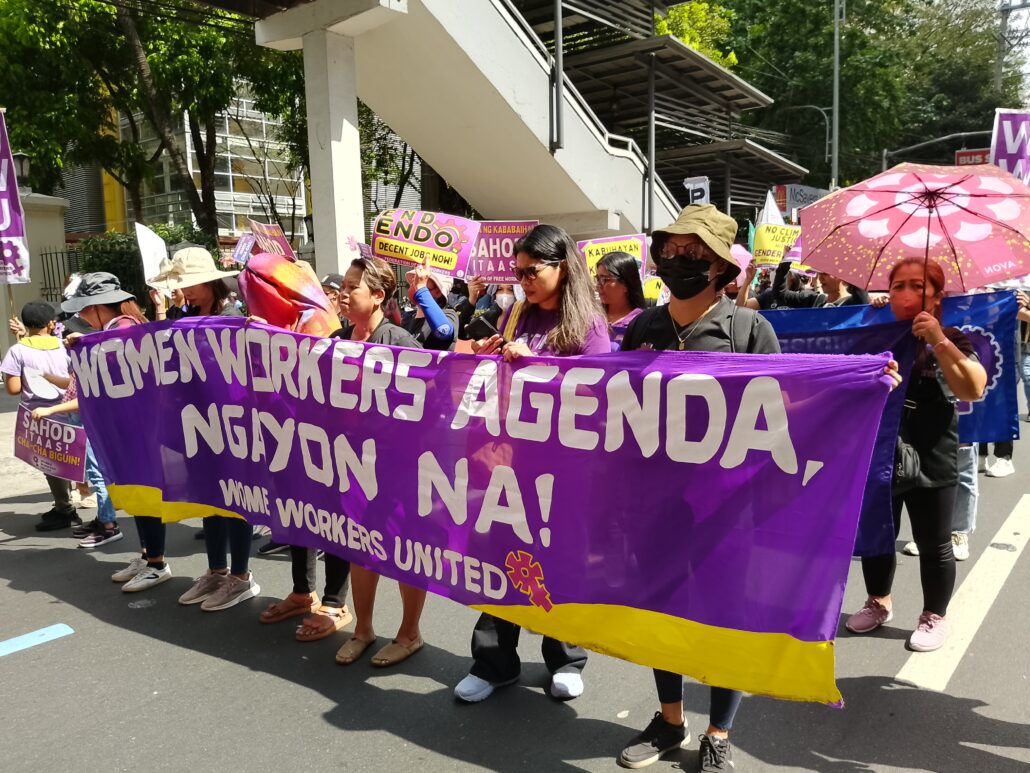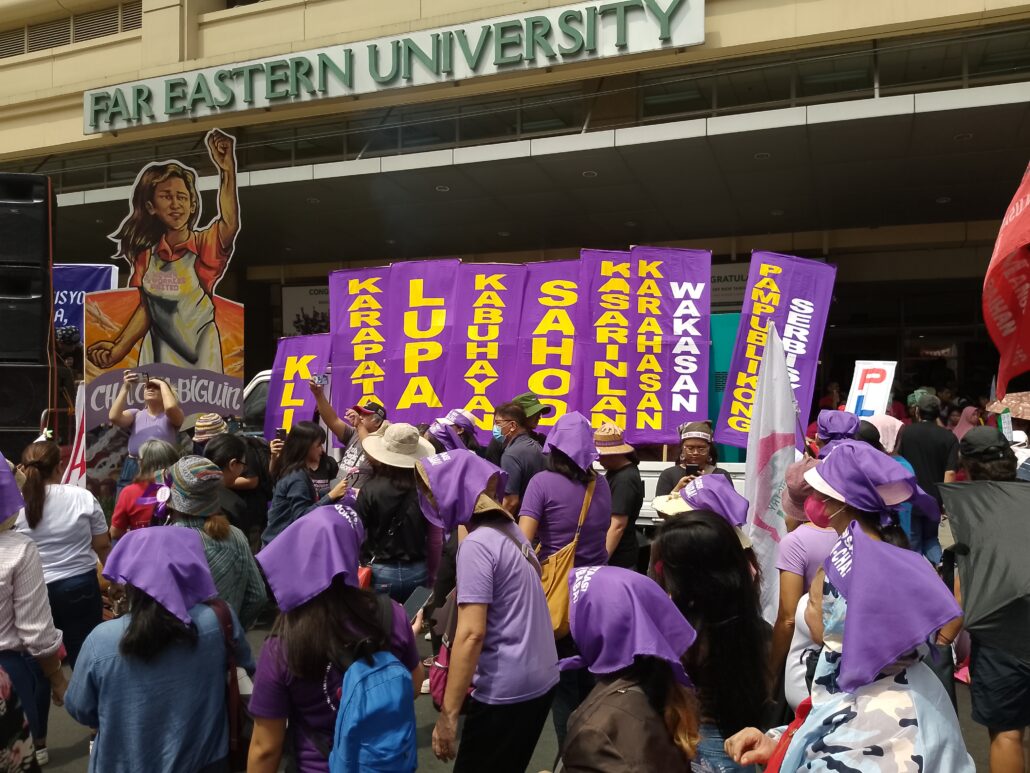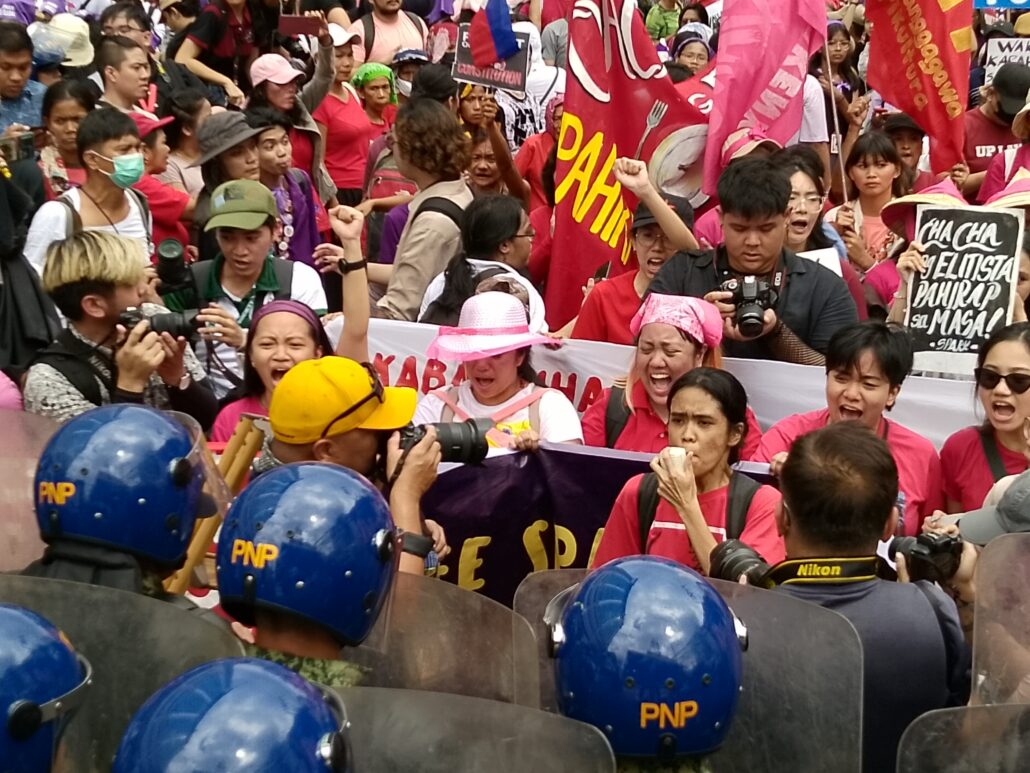By Jose Maria Sison, NDFP Chief Political Consultant
July 14, 2018
After two years of broken electoral promises, mass murder, corruption, deterioration of the economy and sell-out of Philippine sovereign rights, the Duterte regime is isolated and extremely hated by the broad masses of the Filipino people, contrary to persistent pro-Duterte propaganda churned out by the reactionary bureaucracy and the military, mercenary poll survey firms, a major part of the mass media and troll armies deployed by Duterte and his allies.
In a futile attempt to deflect attention from the socio-economic, political and moral issues against him, Duterte has engaged for several weeks in tirades against the God and related religious beliefs of Catholics and Christians. He accused the Catholic and other Christan institutions and their leaders of conspiring with the broad united front of patriotic and progressive forces that seek his ouster. The anti-God and anti-Christian rants of Duterte have served to undermine his own dwindling following and to further outrage the people and isolate him.
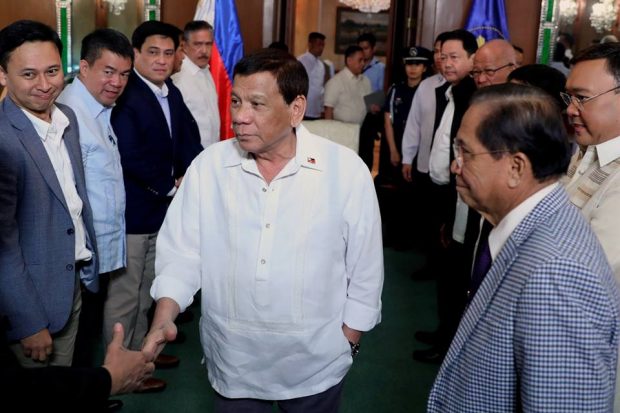
PCOO photo.
- False Promise to Solve the Problems of Illegal Drugs, Criminality and Corruption
Duterte came to power mainly on the demagogic promise of wiping out the drug problem, criminality and corruption within three to six months after assuming the presidential office. After two years in power, all these problems have become worse and more rampant. He has paid the most attention to the drug problem in order to display an iron fist by unleashing his death squads against the poor people in urban slums. The blood of drug lords at the level of governors and generals has been spared.
There has been only a Mafia-style rearrangement of the crime families. Duterte has emerged as the supreme lord and protector of the illegal drug trade, with his own close relatives like Paolo Duterte and cronies like his compadre Peter Lim, as his direct agents in their respective turfs. They have ensured that drug smuggling and nationwide distribution of illegal drugs are unabated. Peter Lim and other drug lords who face charges on the basis of evidence have been absolved recently by Duterte through his department of justice secretary Vitaliano Aguirre.
Some mayors who operate as drug lords in independent turfs and who have been slow at submitting themselves to the supreme lord and his adjutant lords have been ruthlessly murdered in their own homes or even in prison by police teams brazenly designated by Duterte. The worst phenomenon in the so-called war on drugs has been the murder of more than 23,000 alleged users and pushers of illegal drugs in urban poor communities.
The perverse logic of Duterte in calling for the extrajudicial killing of the poor suspects is to destroy the demand or market for the drugs. He openly calls on the police to list down drug suspects and surrenderers and to frame up a number of them in order to fulfill kill quotas in exchange for rewards in cash and promotions in rank. He further assures the police of impunity and, in any rare case of indictment or conviction for extrajudicial killing, presidential pardon.
Criminality has become aggravated because Duterte himself has used many police and military officers for criminal purposes and corrupted them mainly with cash rewards from his confidential and intelligence funds. He has directed them to list down alleged drug addicts and pushers, suspected petty criminals of various types, even mere loafers or loiterers who linger in the streets for relief from their cramped and humid shacks and alleged members and supporters of the Communist Party of the Philippines (CPP) and the New People´s Army (NPA). The lists are subsequently used by the police and military for fulfilling kill quotas and getting rewards in cash and rank promotions.
An early sign that Duterte was not serious about his promise to wipe out corruption, especially at the highest level, was his refusal to arrest and prosecute those most liable for pork barrel plunder in the previous Aquino II regime as well as his efficient push on the Supreme Court (dominated by his and Arroyo appointees) to dismiss charges of plunder against former president Gloria Arroyo and other high officials. It has come to light that the biggest Luzon-based plunderers like the Marcoses, Arroyos and Estradas have been among the biggest electoral campaign financiers and supporters of Duterte.
Duterte´s office of the president now takes the lead in corruption with most of the confidential and intelligence funds amounting to 2.5 billion pesos for 2017 going mainly to the pockets of Duterte and his military and police trustees. Corruption is also involved in the bloating of other presidential expenses for travels, communications, equipment and the like. Cabinet members like Justice secretary Vitaliano Aguirre have scandalized the public by absolving Peter Lim and other drug lords, with the obvious approval of Duterte.
Corruption is business as usual in all departments at all levels of the reactionary government. Duterte has ignored discoveries of anomalies in high offices by the Commission on Audit. The more he has ignored complaints from the public against corrupt officials. In a few token cases, he has fired his own appointees on charges of corruption but after only a few months he reappoints them to other lucrative positions. He develops personal loyalty to him through complicity in criminality and corruption.
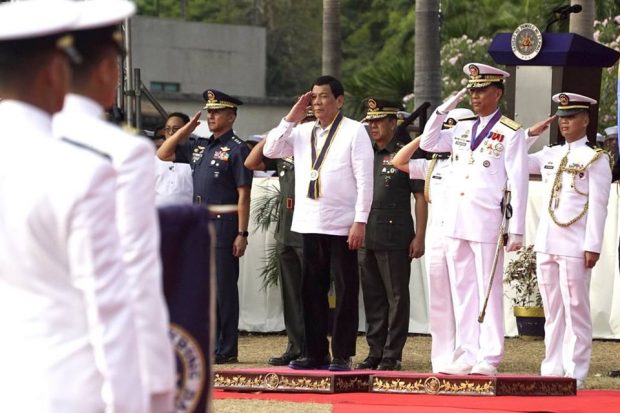
PCOO photo.
- Destruction of Marawi City, Lumad and Other Rural Communities in Mindanao and Nationwide
The indiscriminate bombing and destruction of Marawi City from May 23, 2017 onwards were done to show off the arrogance and iron fist capability of the Duterte regime with the help of imperialist powers. Duterte deliberately refused to avail of the offer of the Sultan and 15 leading families of Marawi City to negotiate with the Maute and Abu Sayyaf groups and ignored their repeated plea for the AFP to stop the bombardment.
He wanted simply to demonstrate his destructive power causing the devastation of the city, the death of thousands of residents and his own military and police personnel and the forced evacuation of 400,000 to 500,00O people within and around Marawi, and the plunder of their homes by marauding soldiers. Tens of thousands of families are now being prevented from recovering their home lots and are unsure of getting compensation for the destruction of lives and property. A big number of evacuees are stranded in the cramped homes of relatives and in miserable evacuation centers.
The cost of military operations to destroy Marawi City amounted to more than three billion pesos. More than 120 billion pesos are estimated for the reconstruction and rehabilitation of the city. Billions of US dollars of foreign assistance for the same purpose are unaccounted for. Like conquerors, the military cohorts of Duterte occupy and rule the city and many areas of the entire Mindanao, with the initial 60 days of martial law extended to the end of 2018 by the Supreme Court that is obsequious to Duterte.
Priority is being given to the construction of a big military camp on ten hectares where the Marawi city hall used to be located. This is in addition to the long standing Camp Ranao. A group of Chinese companies are favored by Duterte to build commercial stores and tourist facilities. Maranaws who used to applaud whenever he claimed to be descended form a Maranaw grandmother now call him Dutiti (meaning to say, poison in the Maranaw language).
The plan to destroy Marawi City was used to justify the declaration of martial law in the entirety of Mindanao and to justify the earlier military attacks on the Lumad and Bangsamoro communities under Duterte´s all-out war policy. Earlier than the bombardment of Marawi City, Duterte had ordered the bombing, invasion and occupation of the land and structures of Lumad communities that have been forced to evacuate. As early as January 2017, the AFP started to carry out Oplan Kapayapaan which combines psywar, intelligence and combat operations.
To terrorize the people, the military and paramilitary forces of the regime and mining companies have gone on a rampage, threatening and killing community leaders, teachers and activists. The schools for Lumad children at primary, elementary and high school levels that the Lumad communities have built in cooperation with religious and nongovernmental organizations have been closed. Food blockades and the fake listing of the people as NPA fighters and supporters have been undertaken. The atrocities were committed even during periods of ceasefire in connection with the GRP-NDFP peace negotiations.
Under the pretext of fighting the people´s army, Duterte has made it his characteristic act to bomb communities or rain artillery fire on them. Then the military, police and paramilitary forces proceed to commit further atrocities and compel people to evacuate. This is the modus operandi of the regime in the entirety of Mindanao and nationwide in order to deprive the people of their land and related resources and make these more available than ever before to the mining, logging and plantation companies owned by foreign and big comprador interests.
To realize his ambition of becoming a fascist dictator that is more efficient than Marcos in intimidating and controlling the people, Duterte is already undertaking a series of actions to lay the ground for the proclamation of nationwide martial law or a state of emergency which he dubs ¨revolutionary government¨. The ongoing martial rule in Mindanao is the dress rehearsal for its nationwide application. He has unleashed a series of operational plans for implementation in urban and rural areas for the listing of alleged drug addicts, criminals, loafers and terrorists and for the arrest and extrajudicial killing of those selected from the lists.
He is set to establish a national ID system for the purpose of systematic national surveillance and random checks on people. The Human Security Act (or Anti-Terrorism Act) is being amended by the Duterte-dominated Congress to widen the definition of terrorism as to include dissent, mass protests and strikes, increase the detention period of suspects from 3 to 30 days without charges, increase the penalty for terrorism so-called from 40 years to life imprisonment and to delete the fine of 500,000 pesos per day on the erring police officer for illegal detention. The amendments are meant to realize martial law even without proclaiming it.
People are being deceived to have themselves listed up in order to clear themselves and to receive supposed benefits. But the lists serve as basis for carrying out extrajudicial killings and causing mass intimidation. These have practically created a de facto situation of martial rule on a nationwide scale. There are also increasing cases of exemplary killings and harassments of local political oppositionists, religious leaders and social activists who are tagged by the military and police as NPA supporters for standing up for national freedom, democracy, social justice and environmental protection.
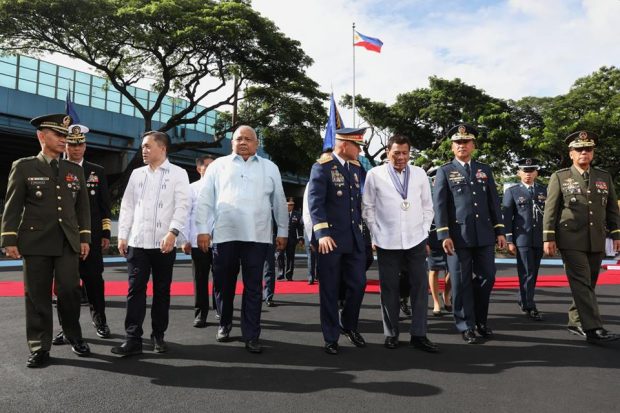
PCOO photo.
- Repeated Terminations of the GRP-NDFP Peace Negotiations by Duterte
Duterte was never interested in pursuing sincere and serious peace negotiations with the National Democratic Front of the Philippines (NDFP). He was merely play-acting when he said he would like to make peace with the people´s revolutionary movement and become the first Left and socialist president of the Philippines. He promised to the NDFP on May 16, 2016 to amnesty and release all the political prisoners even before the start of the peace negotiations.
After assuming presidential office, he withdrew his promise to amnesty and release all political prisoners. In violation of The Hague Joint Declaration of 1992, he kept on making preconditions amounting to the surrender of the revolutionary forces and the people and the liquidation of the people´s democratic government based in the countryside. At the outset of the talks, he ordered the widespread deployment and prepositioning of its troops in at least 500 barangays (villages) nationwide.
Failing to impose his preconditions, he fabricated reasons for terminating the negotiations several times. He declared the first termination on February 4, 2017, when he complained of an alleged incident which his negotiating panel could have presented appropriately to its counterpart and to the Joint Monitoring Committee under the Comprehensive Agreement on Respect for Human Rights and International Humanitarian Law (CARHRIHL). His defense secretary Lorenzana declared all-out war against the revolutionary forces and people.
Nevertheless, Duterte agreed to the holding of the 5th round of formal talks on May 27 to June 1. But he ordered the GRP Panel and OPAPP secretary Dureza not to participate in the formal talks, unless the CPP withdrew its order calling for the further intensification of people´s war against the declaration of martial law in Mindanao. There was no ceasefire agreement and there was no way the NDFP negotiating panel could report and make recommendations to NDFP National Council and the CPP within the span of 72 hours. Duterte suspended the formal peace talks and threatened the arrest of eleven NDFP consultants upon their return to the Philippines.
He sued for a resumption of formal peace talks sometime in July 2017 but again unilaterally canceled these on July 19 when he made the brazen lie that the NPA tried to ambush his presidential convoy in Arakan, Cotabato on July 18. In fact, he was not in any of the unmarked vehicles which were fired upon because they ran through an NPA checkpoint. There was no ceasefire agreement in place. And Duterte did not get any prior permission from the CPP and NPA through the NDFP to pass through the territory of the people´s democratic government.
The second time that Duterte terminated the peace negotiation was on November 23, 2017 when he made the false claim that the NDFP was demanding a coalition government led by the CPP. He issued Proclamation No. 360 terminating the peace negotiations. This would be followed on December 5, 2017 by Proclamation No. 374 designating the CPP and NPA as ¨terrorist¨ organizations. These two proclamations are aimed at putting up permanent walls against peace negotiations.
In any event, he instructed his negotiating panel to engage its NDFP counterpart in back channel talks through their respective teams of representatives from March to June 2018 in Utrecht. Several agreements were arrived at and initialed by the two panels, especially the so-called Interim Peace Agreement (IPA), wrapping up an agreement on coordinated unilateral ceasefires, a certified copy of Duterte´s proclamation to amnesty and release all political prisoners listed by the NDFP and the sections on Agrarian Reform and Rural Development and National Industrialization and Economic Development of the Comprehensive Agreement on Social and Economic Reforms (CASER).
The IPA was scheduled to be signed by the negotiating panels at the resumption of formal talks in Oslo from June 28 to 30, 2018. But Duterte arbitrarily canceled the resumption of formal talks on June 14, when the stand down agreement to promote the peace talks was supposed to start. And he subsequently announced that he wanted to review the peace process since 1992 and scrap all agreements since then and to require the negotiations to be held in the Philippines under his control, surveillance, manipulation and duress. He simply wants to put the NDFP negotiating panel and related personnel within the range of his gun sight.
He was never interested in complying with existing agreements since 1992 and moving forward in the making of comprehensive agreements on social, economic and political reforms to address the roots of the civil war. Together with the US-directed security cluster of his cabinet, Duterte has come to the conclusion since 2016 that patriotic and progressive agreements though bourgeois democratic in character are impermissibly socialist and communist and should be blocked, even if such agreements have been co-written by the GRP and NDFP negotiating panels.
Duterte and his security cluster in the cabinet are violently opposed to the aim of the peace negotiations, which is to address the roots of the armed conflict and lay the basis for a just and lasting peace, and the mutually acceptable principles of national sovereignty, democracy and social justice, as stipulated in The Hague Joint Declaration of 1992. Duterte and his militarist cohorts aim to mount a decisive military offensive especially in Mindanao and want nothing less than the outright surrender of the revolutionary forces and the people under the pretext of a protracted and indefinite ceasefire.
Duterte has repeatedly blocked the resumption of formal talks by imposing the precondition of a joint ceasefire as an “enabling environment” to advance the negotiations. But this scheme was clearly exposed as a mere excuse to prevent the discussion of basic social reforms, particularly agrarian reform and rural development and national industrialization and economic development when the GRP thrice unilaterally and without explanation backed out at the last minute from agreements for simultaneous stand down or ceasefires immediately preceding formal talks.
In the most recent cancellation of formal talks, Duterte and his militarist cabal have resorted to the old, worn out and discredited excuse of holding public consultations and peace talks at the local level first. These were the same excuses given by the Arroyo and Aquino regimes in suspending the formal talks to avoid discussion of land reform and national industrialization, never to return to the negotiating table for the rest of their term.
But even when a temporary kind of ceasefire was supposed to be in effect as in 2016 and 2017, the military and police forces of the regime were always engaged in all-out war and in the occupation of communities and civilian structures in the rural areas. People were being coerced to have themselves listed as surrenderers supposedly to clear themselves and receive doleouts. As earlier explained, the lists serve as basis of the military for fulfilling the quota for killing people on mere suspicion of being members and supporters of the CPP and NPA.
AFP field officers are coming up with myriad ways of fabricating their lists because they are after the promised funds that are being downloaded directly from Duterte’s confidential and intelligence funds. The AFP has publicly declared that close to 8,000 members of the NPA have surrendered although it claimed in January that there are just above 3,000 NPA fighters.
Duterte´s main interest in pretending to be for peace negotiations is to end these completely and blame the CPP and NPA for the continuance of the civil war so that he can issue proclamations and orders to make a de facto martial law even before the proclamation of martial law nationwide. Right now, a de facto martial rule exists, with the use of operational plans to arrest people without judicial warrants and to kill them without any judicial process. The consuming objective of Duterte is to impose a fascist dictatorship on the people under the pretext of charter change for federalism.
Despite the fact that Duterte has terminated the peace negotiations with his Proclamation No. 360 since November 23, 2016, he and other GRP officials make it appear that the NDFP is responsible for the termination and have demanded that the peace negotiations be resumed in Manila. The revolutionary forces and the people represented by the NDFP have sharply rejected this stupid demand and have expressed their determination to fight the US-Duterte regime.
The regime is now reduced to whimpering and going back to an old discredited trick: localized peace talks. These sham peace talks are little zarsuelas staged by peace and order councils and the military who arrange “peace” meetings and present military assets either as NPA representatives or surrenderers. Even the captive audience is photographed and publicized as surrenderers in the mass media. All these childish tricks of military psywar amount to nothing in the face of the steadily growing armed revolutionary movement and the advance of the revolutionary forces and the people´s democratic government.
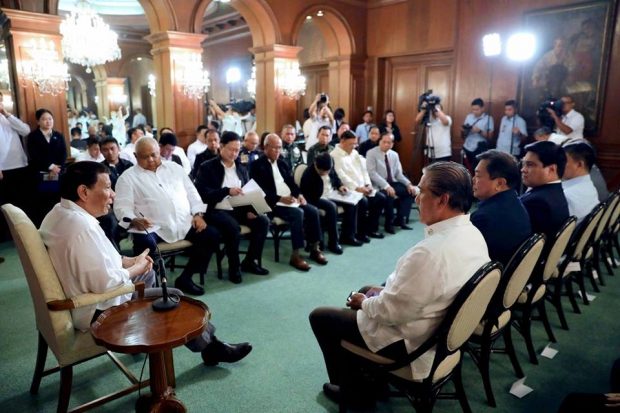
PCOO photo.
- Duterte Scheme of Fascist Dictatorship under the Cover of Chacha for Federalism
Duterte is obsessed with establishing a fascist dictatorship ala Marcos, his political idol, whose extrajudicial killings of around 3,500 over 14 years of autocratic rule he has already surpassed several times in only two years. His objective in unleashing campaigns to arrest people without judicial warrants and kill a number of them without judicial process under the pretext of eliminating suspected drug addicts, criminals, street loafers and terrorists is to terrorize the people and establish a fascist dictatorship.
These campaigns are now being directed mainly against the CPP and NPA and the leaders and mass activists of legal democratic organizations in the anti-Duterte broad united front. They are coordinated with the railroading of the charter change for federalism. The draft of the new charter from the Puno consultative committee, the resolution of both houses and the drafts of PDP-LABAN contain provisions that allow Duterte to have legislative and judicial powers in addition to executive powers during the transition period to a federal system of government. And the grounds for proclaiming martial law have been increased and eased up.
The same trick Marcos used to make a coup against the 1935 constitution is being replayed in the Duterte coup against the 1987 constitution. The supermajority of Duterte in the House of Representatives assures him of concentrating all powers of government in his hand. In a futile effort to deceive the people, he has announced that he would step down as soon as the fascist type of federal constitution would be ratified. But the people do not believe that he would give to another person what he has long craved for. Even now, he has displayed unmistakable signs of hubris from the power, privilege and resources in the hands of a head of state which are incomparably vast to that of a mayor in a remote big city.
The main beneficiaries of charter change are foreign monopoly capitalists who expect 100 percent ownership of entire enterprises in all kinds of businesses and Duterte himself and the regional dynasties and warlords who will further enjoy opportunities for accumulating power and wealth at the expense of the people. In this regard, centrifugal forces are reinforced and emboldened to break up the Philippines ultimately. The reorganization and maintenance of the federal system will entail high costs and large increases of the tax burden at federal, regional and lower levels and will aggravate the financial bankruptcy of the GRP and the social and economic crisis.
In the course of the GRP-NDFP peace negotiations in 2016 to 2017, the NDFP commented that the change of government from unitary to federal does not necessarily mean change for the better but offered to negotiate with GRP a federal constitution that is more patriotic, democratic and socially just than the 1987 constitution and can serve as the basis for the NDFP to co-found the Federal Republic of the Philippines.
Obsessed with monopolizing political power, under his fascist dictatorship, Duterte has deliberately blocked the GRP-NDFP negotiations on political and constitutional reforms. He has also claimed mendaciously that NDFP is demanding from him a coalition government led by the CPP, without the determination of the relative weights of political parties through elections. It is good that the NDFP has nothing to do but to oppose the charter change intended to install a Duterte fascist dictatorship masquerading as a federal government.
The overwhelming majority of the people are vigorously opposed to charter change to put Duterte on a throne of absolute power. They have suffered more than enough the escalation of oppression and exploitation under Duterte. The revolutionary forces and the people are determined to fight the US-Duterte regime and those who persist in supporting the tyranny of Duterte, his gross and systematic violations of human rights, his mismanagement of the economy and all his other intolerable acts in oppressing and exploiting the people.
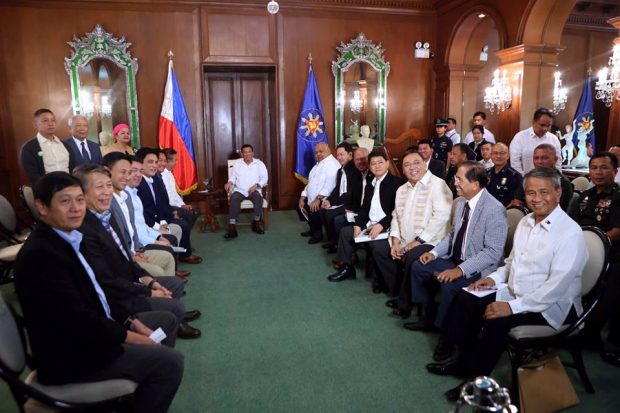
PCOO photo.
- Mismanagement of the Economy, Heavier Tax Burden and Soaring Prices of Basic Goods and Services
Duterte admits that he knows nothing about economics. But he has chosen as policy makers or economic managers economists who adhere to the neoliberal policy regime, who agree with him to continue the policy pursued by the Aquino II regime and who do not comprehend the changes that have occurred in the global and domestic economy even before said regime ended.
The financial meltdown of 2008 has resulted in a prolonged global economic depression, relieved now and then by heavy doses of credit at the level of central banks, corporations and households. The majority of countries have alarming levels of public debt due to budgetary and trade deficits. Only for a while did the Philippines enjoy the big inflow of portfolio investments to buoy up the economy. But these started to flow out at an increasing rate since 2014.
The decrease of income from the export of raw materials and semi-manufactures and less inflow of foreign loans and less direct investments have exposed the underdeveloped, pre-industrial and semifeudal character of the economy and resulted in widening budgetary and trade deficits. The remittances of overseas contract workers and incomes of BPO call agents have been used by the GRP to raise the level of import-dependent consumption. The balance of payments has deteriorated. With dollar reserves declining, the peso has depreciated at the exchange rate 53.6 pesos per US dollar.
The economists of Duterte know nothing beyond the neoliberal parameters of raising tax revenues, spending these for the operations of government and funding imports, servicing the previously accumulated debt and resorting to local public borrowing, foreign loans and investments. The growth rate of the Philippine public debt has tripled since 2016 and has increased by nearly 1 trillion. As of May 2018, the national government has outstanding debt of 6.83 trillion pesos while private loans outstanding for production and household consumption reached as much as 7.28 trillion pesos. Duterte’s budget for 2019 is 3.757 trillion pesos , of which 1.2 trillion pesos need to be borrowed,
The Duterte regime has found no solution to the fall of production in agriculture and industry. It is just too happy that the GDP growth rate rises (supposedly 6.7% last year to 6.8% first quarter of this year) as a result of the growth of consumption, government spending and anti-industrialization investments. It does not care about productive investments to develop a self-reliant industrial economy. In the meantime, the number of unemployed Filipino workers leaped from 7.2 million to 10.9 million from December 2017 to March 2018. As compounded, the unemployed, underemployed and others already discouraged from seeking employment number as high as 13 million out of the labor force of 42.7 million.
The Duterte notion of development is to plunge into an eight trillion peso program of infrastructure projects up to 2022 to be sustained largely with tax revenues in collaboration mainly with Chinese construction companies and suppliers of materials and equipment. The expenditures and foreign debt required will prevent real development through national industrialization and genuine land reform as proposed by the NDFP and will continue to favor the export of cheap raw materials and the import of foreign manufactures.
Under these circumstances, the regime has planned and implemented since January the Tax Reform for Acceleration and Inclusion (TRAIN). The tax burden is increased from phase to phase, with corporations and the wealthy people given tax cuts and the broad masses of consumers paying excise taxes embedded in the inflated prices of basic goods and services they pay. TRAIN takes away anywhere from 1,000-3,000 pesos from the poorest majority Filipinos while giving 50,000–100,000 to the few richest Filipinos. It is scheduled to take even more from the poor and give more to the rich in 2019 and 2020.
The regime is raising taxes from the general mass of consumers, consisting mostly of low-income impoverished working people, swamped by a huge mass of unemployed, in a stagnant and underdeveloped semifeudal economy. The purpose is not only to fund the build, build, build infrastructure program but in fact mostly to pay for the doubled salaries of the military and police and for the rising costs of their operations and equipment, to assure foreign creditors of payment for the outstanding debt service and to cover the ever widening budgetary and trade deficits.
Even at the understated inflation rate of 5.2 per cent, the rapidly rising prices of basic goods and services have caused the accelerated isolation and hatred of the Duterte regime by the people. As a result, the broad united front for the ouster of Duterte which was first motivated by outrage over Duterte´s gross and systematic violations of human rights in his campaign of mass murder and mass intimidation is now further motivated and inflamed by a more sweeping outrage that involves the daily economic needs and survival of the overwhelming majority of the people.
Duterte has expected that he would be able to rev up the Philippine economy and employ more people by going on a spree of building a Metro Manila subway system, railways, roads, bridges, airports and seaports all over the country with the use mainly of foreign loans, construction companies, labor, materials and equipment from China. But there are delays and discordances between Philippine and Chinese counterparts. And yet Duterte´s neoliberal economists are too eager to raise the tax burden in advance in obeisance to Chinese and other foreign creditors.
Wages in the Philippines have stagnated since 2001 and are now assailed by the highest inflation rate since 2009. In view of the soaring prices of basic goods and services, the workers have been pressed by their inadequate income to demand higher wages, job security and the end of short-term contractualization. In this regard, the struggle of 8000 workers dismissed by PLDT exposes the falsity of Duterte´s promise to end contractualization. The homeless urban poor also demand affordable social housing. They have occupied idle substandard government housing but are being subjected to harassment and violent attacks by the police.
In the rural areas, the peasant masses and indigenous peoples who have lost and continue to lose land to corporate and bureaucratic land grabbers are intensifying the struggle for land and cooperate with the people´s army in dismantling the mining, logging and plantation enterprises of the land grabbers who refuse to comply with the laws of the people´s democratic government and who damage domestic food production and the environment.
Land grabbing for real estate speculation and building tourist facilities is rampant. But in one glaring instance of unbridled personal greed, Duterte has used environmental cleanup and land reform as pretext for closing down Boracay island and depriving thousands of families of jobs and livelihood in order to make way for Chinese casino owners and his cronies to take over major parts of the island.
In another conspicuous instance of extreme greed of the Duterte ruling clique is the grant of monopoly to favored bus companies at the expense of the huge mass of poor drivers and small operators of jeepneys, without giving any fair and realistic recourse for them. Adding insult to the injury, Duterte viciously made an outburst that he did not care that his victims were poor and that they would become poorer.
The widespread and intense people´s detestation of the Duterte regime due to the rapidly rising prices of basic goods and services and the steep rise of the rates of unemployment and landlessness are inflaming the struggles of the toiling masses of workers and peasants for jobs, land and better living conditions and are also fueling the mass protests against the escalation of the human rights violations and against the railroading of the charter change for federalism as pretext for a fascist dictatorship.
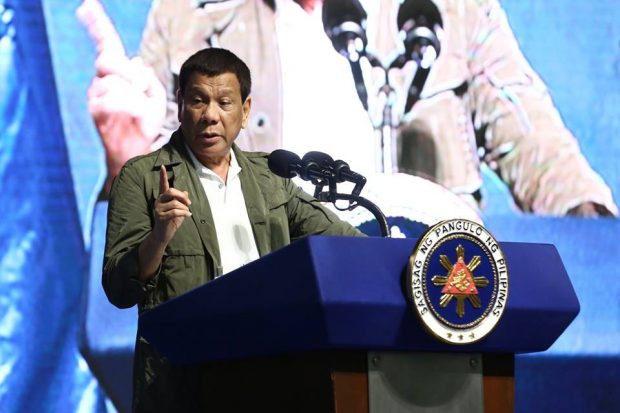
PCOO photo.
- Duterte Is Opposed to Social, Economic and Political Reforms in Peace Negotiations
Duterte has deliberately sabotaged and terminated the GRP-NDFP peace negotiations because of his ultra-reactionary adherence to the status quo under the oligarchy of big compradors, landlords and corrupt bureaucrats like himself. He is diametrically opposed to the very aim of making the comprehensive agreements on social and economic reforms and on political and constitutional reforms, which are the way to address the roots of the armed conflict and thereby lay the basis for a just and lasting peace.
He follows Lorenzana in condemning the NDFP proposed Comprehensive Agreement on Social and Economic Reforms (CASER) as socialism and the comprehensive agreement on political and constitutional reforms (CAPCR) as communist-led coalition government. He wants to retain the underdeveloped and semifeudal status of the economy and to ensure that charter change to federalism results in the the imposition of his fascist dictatorship and the regional dynasties on the people.
Duterte exposes himself as a liar in previously making pronouncements that he is for national industrialization so that Filipinos would no longer become overseas contract workers separated from their family and motherland, that he is for the end of short-term contractualization of labor, that he is for minimum wage and higher wages to ensure a decent life for workers´ families, that he is for land reform and provision of services to the peasants, that the indigenous people have the right of self-determination and are entitled to their ancestral domain, and so on and so forth.
In terminating the GRP-NDFP peace negotiations, Duterte has called for the intensification of all-out war against the revolutionary forces, the people’s army and the people this year and thereafter. He leaves them with no choice but to fight back and take the initiative to launch offensives on a nationwide scale. The CPP, NPA, all allied forces of the NDFP and the people´s democratic government have declared that they are prepared to defend themselves and intensify people’s war through extensive and intensive guerrilla warfare on the basis of an ever widening and deepening mass base.
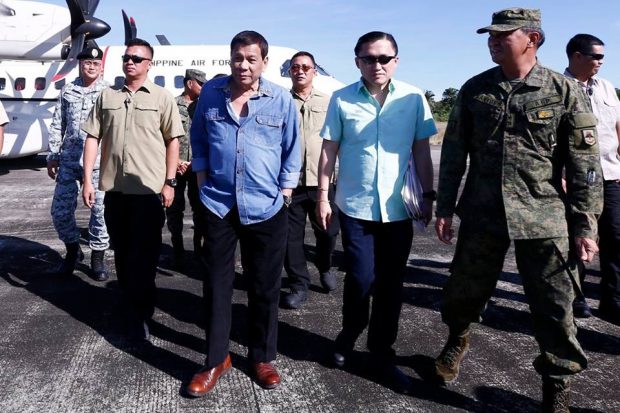
PCOO photo.
- False Independent Foreign Policy in Relations with US and China
In the first six months of the Duterte regime, US President Obama and members of the US Congress were alarmed by the extrajudicial killing of thousands of alleged drug addicts and pushers by Duterte´s police death squads. They threatened to cut down US military assistance in consideration of human rights violations. Duterte was riled and threatened to veer away from the US and towards China and Russia. He also claimed to be forging an independent foreign policy.
But he cozied up to US President Trump and was assured of unlimited US military assistance under Trump´s Operation Pacific Eagle-Philippines. Since then, he has fully exposed himself as not really being for an independent foreign policy. He is in fact traitorously keeping the Philippines under the domination of both the US and China and making deals at the expense of the Filipino people and for his own benefit together with his cronies.
Since assuming presidential office, he has retained all the treaties, agreements and arrangements that make the Philippines subservient to US imperialism economically, politically, culturally and militarily and which give US military forces extraterritorial rights in the country. He has aggravated US military dominance over the Philippines by accepting Trump´s Operation Pacific Eagle-Philippines by which he can receive unlimited US military assistance through the circumvention of US congressional oversight.
He has found an additional foreign master in China, a rising imperialist power. He has laid aside the final judgment of the Arbitral Tribunal of July 12, 2016 which recognized the sovereign rights of the Philippines over its exclusive economic zone and extended continental shelf in the West Philippine Sea and over the Panatag Shoal in accordance with the UN Convention on the Law of Sea. He has made no protest to China´s militarization of the Spratlys and has practically conceded to China the trillions of dollars worth of oil, gas and other natural resources in exchange for a few billions of dollars of high-interest Chinese loans for infrastructure projects.
These projects are extremely onerous. Chinese construction firms are in control of the projects. Sixty per cent of the labor force is Chinese. The interest rate on the loans is far higher than that on Japanese concessional loans. Worse, the projects are overpriced. Construction supplies and equipment are 100 percent Chinese. In case of payment defaults, the loans are subject to more onerous terms and to conversion to Chinese equity. Thus, the infrastructure projects face the prospect of becoming Chinese property as in Sri Lanka, Pakistan and elsewhere.
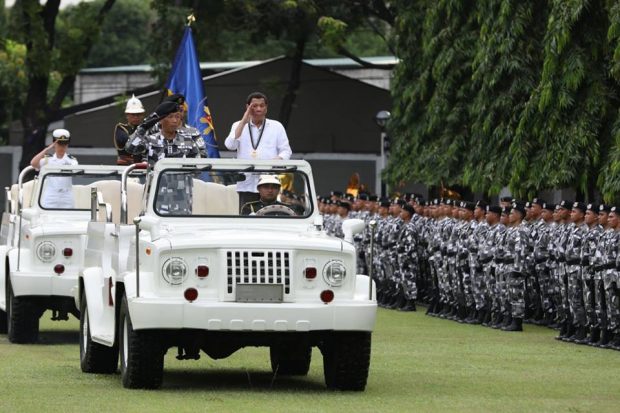
PCOO photo.
- Growing Resentment against Duterte among Military and Police Officers and Men
When he still had cordial relations with leaders of the revolutionary movement, he told them that, as GRP president, he had to demonstrate to the AFP and PNP that he was their commander-in-chief, he would pretend to carry out an ¨all-out war¨ not really to destroy the NPA but to overstretch and wear out the military and police brigades in futile search and destroy operations and so-called peace and development operations and ultimately to favor the armed revolution with more easy targets for guerrilla offensives.
But for all intents and purposes, he is deploying the AFP and PNP in a mad drive to really suppress the armed revolution and clear the way for establishing his fascist dictatorship. Nonetheless, he is actually overstretching, overstraining and wearing out his military and police forces. Since he became president, there has been no letup in the all-out war under Oplan Bayanihan up to the end of 2016 and under Oplan Kapayapaan from early 2017 onwards.
There has been no respite for the AFP and PNP maneuver units. The bulk of these has been deployed in Mindanao, undergoing the rigors of combat in Marawi City and also enforcing martial law in the rest of Mindanao, where they have to battle with the NPA and Bangsamoro armed groups. Of Duterte´s current total of 98 AFP battalions, he has deployed about 75 percent in Mindanao—50 percent against the NPA and 25 percent against the Bangsamoro group– and only about 25 percent in Luzon and the Visayas.
With this kind of deployment, the NPA can easily fight back and take initiatives in launching offensives. The total strength of AFP and PNP combat troops cannot effectively cover and control all the more than 40,000 barangays of the Philippines and all the areas of responsibility and guerrilla fronts of the NPA. On the average, there are not even two AFP soldiers per barangay. From their guerrilla base and zones, the NPA can move freely in more than 80 per cent of the barangays.
The NPA can use the national scale of the guerrilla fronts for fluid movement and flexible use of the tactics of concentration, shifting and dispersal, depending on circumstances, and the depth of the social and physical terrain of particular guerrilla fronts to lure in the enemy forces for annihilation. At the same time, it can deliver unexpected blows to certain vital but vulnerable parts of the enemy forces.
There is growing resentment among AFP and PNP officers and lower personnel against the Duterte regime despite the doubling of their salaries. Their grievances include the following: they are being overworked and being put in harm´s way too often, the less deserving among them get promoted, they are being used for extrajudicial killings and other criminal purposes and a big number of them are being corrupted with rewards in cash for carrying out unlawful orders that violate professional standards and service rules.
There is an increasing number of active and retired AFP officers who are in touch with the popular movement to oust Duterte. They wish to develop a movement of officers and enlisted personnel to coordinate with the growing mass protest movement and withdraw support from Duterte at the decisive moment. They emulate the examples of AFP officers who withdrew support from Marcos in 1986 and Estrada in 2001 and helped effect their ouster.
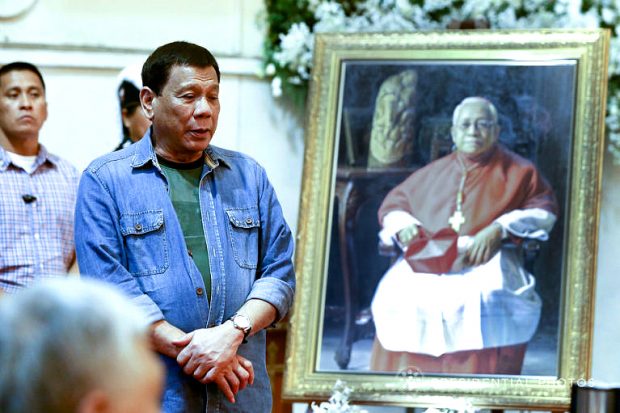
PCOO photo.
- Duterte´s Use of Abusive and Violent Language and Attacks on Catholics and Christians
While he was campaigning for the presidency, Duterte´s use of abusive, vulgar and violent language against his political rivals and those whom he accused of being involved in illegal drugs, criminality and corruption was entertaining to audiences in mass meetings and was even praised as a manifestation of an honest and frank character.
But since becoming president, Duterte´s use of the same gutter kind of language and content in rambling speeches have become repulsive not so much because of boring repetition but because of the attempt to deflect attention from unfulfilled promises, failures and aggravation of problems.
Duterte has increasingly used abusive, vulgar and violent language to rouse hatred among his political followers against his critics and opponents, to goad the military and police to engage in violent actions against the people and to express contempt for the working class and peasantry, the national minorities, women, the youth activists and other people.
The madness of Duterte in using his kind of language is not simply because he is crazed by Fentanyl and by power or that he is a psychopath and sociopath as professionally established by a court-approved psychiatrist and officially certified in his divorce case. It is easier to understand that he is driven to gain more power and wealth and it becomes necessary for him to intimidate people and rouse his political followers and his military and police subalterns to protect him.
The extremely violent character of his regime is defined by both his language and the actual escalation of exploitation and oppression. Even as he has failed to deliver on his promises to end contractualization, raise wages, carry out land reform, create industries and more jobs, the police under his inspiration have become more brutal in suppressing worker and peasant strikes.
Even as he has failed to deliver on his promise to give land to the landless tillers and to assure the indigenous people to keep their ancestral domain and whatever schools and cooperatives that they have established, he has been extremely vicious in ordering the bombing and military occupation of rural communities in order to make more land and more resources available for exploitation by foreign and big comprador mining, logging and plantation interests.
He has directed the military and police to target the youth activists for terrorist labeling and listing for the purpose of violent actions, including abduction, torture and murder. He has displayed with utmost arrogance the worst kind of misogyny, including his call on troops to rape women or shoot them in the vagina in order to make them useless. This exposes his view of women as mere sex objects.
There is no limit to the vileness and malice of Duterte. In a futile attempt to distract attention from the socioeconomic and political problems he has generated, he has gone so far as to use his presidential authority to attack the religious belief of Catholics and Christians and generate a climate for persecution and murder even of religious leaders. As if to proclaim his own stupidity, he has boasted of his own concept of God and attacked the God of the Catholics and Christians as stupid and lacking common sense, in gross disrespect and violation of the freedom of thought and belief.
As a result of his attacks on the God of the Catholics and Christians, a great number of his followers have left his camp and have put into question his sanity and competence to rule. He has become thoroughly isolated by a combination of factors which include state terrorism, mass murder, soaring prices of basic goods and services and high unemployment rate and his gross disrespect for Catholics and Christians.
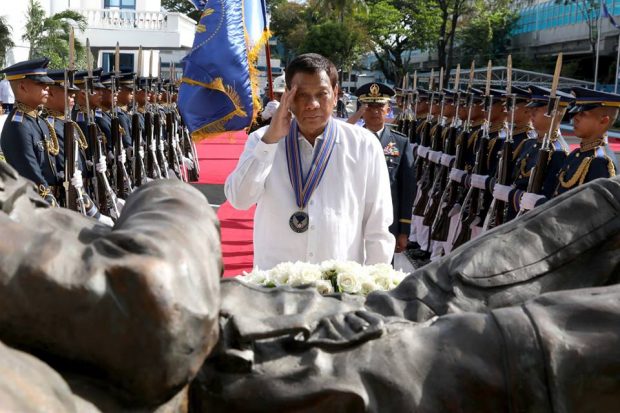
PCOO photo.
- Growing Movement for the Ouster of the Duterte regime
In real fear of being ousted as well as in furtherance of his scheme to establish a fascist dictatorship by scapegoating the CPP and NPA, Duterte has taunted them as incapable of ousting him and his ruling clique.
But the process of ousting a president of the neocolonial republic has been successful in the cases of Marcos in 1986 and Estrada in 2001 without the NPA having to engage in battles in Metro Manila and the CPP having to take power here.
To oust a brutal and corrupt despot it is sufficient that a broad united front of legal patriotic and progressive forces engage in mass mobilization through marches and rallies, culminating in the withdrawal of support by his own military and police personnel.
Indeed, Duterte has more to fear from his own assumed instruments of terror than from the NPA. Reports are rife that a moderate group of military officers is poised to demand the resignation of Duterte. Another group is poised to take action in order to compel the ouster or resignation of Duterte.
The most important reason why Duterte is now in danger of being ousted from power is that he has grievously offended the working class, the peasantry, the middle strata of the bourgeoisie, the national minorities, the women, the youth and others. They have become aroused, organized and mobilized to oust Duterte from his arrogant perch because of his reign of greed and terror.#
